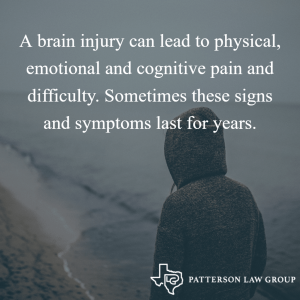Brain injuries are one of the leading causes of disability and death in the United States. According to the Brain Injury Association of America, 2.5 million people sustain a traumatic brain injury (TBI) each year. According to the Centers for Disease Control and Injury Prevention, the leading causes of TBI are:
 Falls (40.5%)
Falls (40.5%)- Other/Unknown (19%)
- Struck by/against events (15.5%)
- Motor Vehicle-traffic crashes (14.3%)
- Assaults (10.7 %)
Brain injuries can come with long-term, wide-ranging physical and psychological complications. In some cases, victims may not realize they have a brain injury until way later after a trauma. If you suffered head trauma in the state of Texas as the result of someone else’s negligence, you should immediately see a doctor and then contact a personal injury attorney.
A brain injury, or any kind of head trauma for that matter, shouldn’t be ignored. A blow to the head, a jolt, or even just a head bump can cause brain injuries. Brain injuries that lead to a loss of consciousness are obviously serious. But, many victims of head trauma don’t realize they could have major brain problems even if they haven’t lost consciousness.
Signs and Symptoms of a Brain Injury
A brain injury can lead to a person experiencing physical, emotional and cognitive pain and difficulty. Sometimes these signs and symptoms last for long periods of time. Many times, the signs of brain injury don’t show up immediately after the initial trauma. Instead, they appear days, weeks, months or even years later.
Neurology, the American Academy of Neurology’s journal, recently published a report showing that a person who has sustained a mild concussion can show signs of brain damage on brain scans taken months later.
Short-Term Effects Traumatic Brain Injuries
Neurologist Dr. Raina Gupta says that physicians know a good deal about brain injuries’ short-term effects on the human body. A person who has suffered a brain injury, he states, will generally experience:
- Headaches
- Irritability
- Depression
- Dizziness
- Seizures
- Double vision
- Insomnia
- Memory loss.
These symptoms typically reveal themselves within the first few days following a mild brain injury, and then usually fade away within a couple of weeks or months. But, not always. Dr. Gupta feels it’s important for anyone who has sustained a head injury, even quite some time ago, to know that the injury might have something to do with persistent cognitive difficulties. Feeling like you’re foggy or mentally drained could be due to a head injury inflicted long ago. It’s best to talk with a doctor if you have any issues with confusion, memory loss, or mental clarity – or even sleep or mood – after suffering a head injury.
Long-Term Effects of Traumatic Brain Injury
Suffering any kind of brain injury can be life changing and catastrophic. Since a brain injury often doesn’t manifest itself for months following head trauma, a person might not realize the gradual changes in behavior or cognitive ability that stem from the injury. Cognitive changes to look out for after suffering head trauma include mood swings, verbal outbursts, and irritability.
- Physical symptoms months later that may be due to a prior head injury include:
- Headaches
- Fatigue
- Sleep disorders
- Nausea
- Seizure
- Tinnitus
Often, a person who has sustained a brain injury may find that later they’re diagnosed with secondary psychiatric disorders including depression, perceptual-motor disorders, and even early onset of Parkinson’s or Alzheimer’s disease.
If you’ve suffered a head injury, you should speak to a doctor immediately. After that, contact Patterson Law Group. Our team of personal injury lawyers wants to hear your story. Fill out the form on this page and we will be in touch with you promptly.




